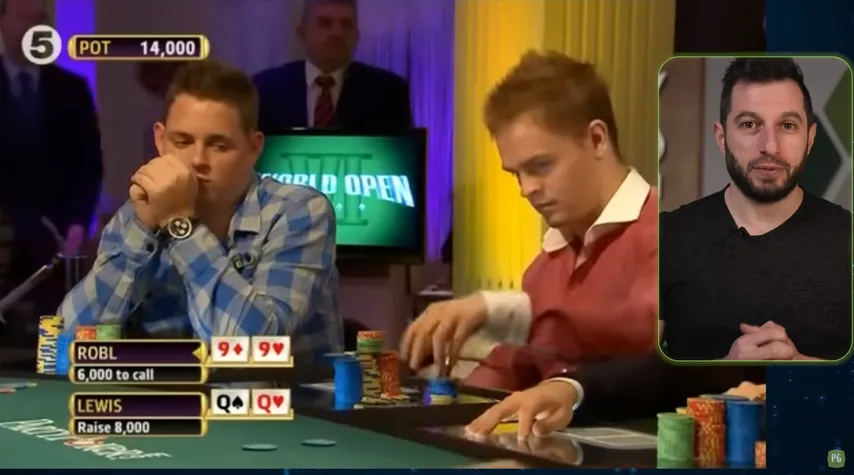Hey everybody!
Today we are going to look at a very fun hand where my good friend Andrew Robl gets into a quads versus quads confrontation against Toby Lewis. Let's get into the action.
Editor's Note: Here's the original hand with Toby Lewis and Andrew Robl. This particular clip has almost 5 million views.)

We are at the PartyPoker World Open, and this table of players is going to split and fight for about $500,000 with $200,000 up top.
It starts with Toby Lewis on the button; he raises to 8,000 at 2k/4k with . They are playing a little over 200k deep, something in the 250k range. Andrew Robl here in the small blind with has a decision. I think that today he would 3-bet this hand, although in a tournament structure it gets a little dicey. The fact of the matter is he's facing a button open; he's got pocket 9's in the small blind—it's a really good hand and he needs to be 3-betting.
Now, if he faces a 4-bet it starts to become a tough spot, but I think he should deal with that when he gets there. I'm not going to fault Andrew too much for this; this is back when he was just a little baby. Yevgeniy Timoshenko calls in the big blind with , and we head to a very exciting flop.
The Flop
We head to the rainbow flop. Andrew Robl flops a full house while Toby Lewis flops quad Queens. Andrew cannot win this hand unless he somehow magically bluffs Toby off the best hand. But he does like his hand sitting here in the small blind with pocket 9's and actually decides to lead out 18,000 into 24,000.

I don't mind this play; I would tend to just check my full range and figure out what to do after the button bets. But it might be a situation where he feels like if he bets here with pocket 9's he's going to get a lot of hands to call that might not have bet—like some Ace-high hands or , hands that might have decided to take a free card. He might get called by a hand like pocket 7's that was not going to bet itself and of course he could get raised.
I don't mind this lead; I would have checked. Andrew bets 18k. Yevgeniy folds his Deuces prudently and it gets over to Toby Lewis who decides to raise right away to 42,000. Now, I would not do this in today's games; you tend to want to play slower when you have the board completely crushed and keep your opponent bluffing.

When he holds all the Queens, it's very likely that Andrew either has A-9 that he's trying to play kind of pot-protection-y or some kind of semi-bluff. He would like Andrew to keep bluffing, so I would just call here.
The fact of the matter is back then there were a lot of click wars—which is what we call it online—when somebody bets an amount you click back with a min-raise and they click it back and you get like five bets in on the flop with all min-raises or so.
(Editor's note: Phil Galfond then shows the following video)
That doesn't happen these days anymore because it's so not theoretically sound. Actually, it's not as unsound as you may think—but anyway—it doesn't happen these days very often.
I think back then, what Toby Lewis is thinking is that Andrew is a really aggressive player. By raising here small, whatever Andrew has, he obviously is going to have some connection with the board most of the time. Toby probably feels he'll continue in some way; he might even 3-bet the flop with a hand like . Again, both these plays I wouldn't make, I don't mind either of them.
Now Andrew, facing this raise, is obviously not going to be folding. I think he has a close decision between calling and raising. If he's up against a Queen, it's very likely that they're going to get all the money in. But it’s also very likely they’re going to get all the money in later anyway. So, I do like his decision to just call.

The other option, of course, is he can click it back and get called by a hand like K-J, which might then bluff later—something that I think back in this day does work out very well on average. But yeah, I like his just call here overall.
The Turn
Now we head to the turn, which is the Five of Spades—it brings a backdoor flush draw—not that it matters to either of these two players with their hands. Andrew checks over to the flop raiser and Toby Lewis fires out a bet of 63,000 into 108,000.
I think that Toby could consider checking back here. Again, he crushes this board and it's very possible that Andrew would have led with a hand like J-10, K-10, K-J, or J-8 and then floated out of position against this flop raise. So Toby Lewis by checking back could induce a bluff on the river.

The fact that he bets here says to me that he really believes a large part of Andrew's flop leading range is going to be hands like , —maybe pocket Tens if he would have played it this way pre-flop—maybe even pocket Eights. Thinking back, this was the kind of play people would make; they would think: "Well, I don't really want to check-call and give all these free cards... I probably have the best hand; I'll bet and get some people to fold and take down the pot or get people to call with worse." Just be easier to play the hand.
So Lewis is definitely putting Robl on hands like or and I don't mind the bet. Now Andrew being out of position means there's going to be less than pot remaining on the river so I think he definitely needs to just call here.
This is clearly the right play. If you're up against a Queen you're going to get all-in on basically every river and if you're up against a hand like you certainly don't want to shove and have him fold his 0% equity.

The River
Now, here's where things get interesting again. The river is the . Andrew thinks to himself, "It's good to see you!" and he decides to lead. Now, this is a spot where the way the hand is played, Toby is saying he has a Queen while Andrew is saying he has showdown value. So, he's representing a hand like 9-x or pocket Tens. Maybe he has a Queen himself; obviously, he could have a slow play like this or an underpair perhaps. Maybe he could have some kind of and really not be believing Toby Lewis.

But I think for the most part, Andrew has the bluff-catcher range which includes some slow plays, while Toby Lewis has Queens full or a bluff. In cases like this, you would usually want to check and let your opponent bluff. However, I think this is a really interesting decision by Andrew and there’s merit to it.
So, if we break this down logically: if Toby Lewis has a Queen, the money's going in; it doesn't matter what we do. The question is: What should we do if Toby Lewis does not have a Queen? If he doesn't have a Queen, I think he's very often going to have a hand like or —all of the gut shots I've been talking about throughout this video.

What's interesting is that Andrew's shove doesn't make a lot of sense. If he has a Queen, would he shove? Maybe, maybe not. It's a pretty weird shove to make if you do have a Queen and I could see Toby getting very skeptical and suspicious of this river shove. What would make sense for Andrew to have is a hand like pocket Eights that led out to try to clear the field—thinking he might have the best hand and making it easier to play.
He didn't believe Toby Lewis on the flop and called with his Eights; didn't believe him again on the turn—again, this was back in the day when we were non-believers—and then on this river now gets counterfeited and just has 8-high and feels like he needs to bluff.
The question is: when Toby has a hand like , are we going to make more money by checking or by betting? I think there’s an argument to be made on either side. I think it's relatively unlikely that Lewis is going to call with King-high against the shove but I also think it's relatively unlikely he's going to bluff-jam. It's overwhelmingly likely he has a Queen or a Nine at this point and people generally don't like to try to fold people off of full houses.
I think it's very possible that Toby would just check back the King-high; I also think it's possible that he could call with it although not super likely. It's really interesting and shows the strong mind that Andrew had at what must have been 21 or 22 if I remember correctly. I think I like this play; I can get behind it despite it not being something that makes sense to me in theory.

Now, in this case, Toby Lewis got all the money because it was quads versus quads—but it’s important to think about how you play your huge hands. Do you want to fast-play on the flop like Toby Lewis did? Do you want to slow-play and induce bluffs from your opponent? It really depends on the board texture, the makeup of the pre-flop ranges, and the makeup of the flop ranges—as well as your read on your opponent and how they're going to react.
I hope you enjoyed this one! I only really enjoyed watching Andrew get crushed here because I know that this was part of how he set up for the career that he's had since that point—but generally, I prefer not to watch my friends lose.
Unbelievable! I'll see you in the next video. Take care and good luck!



















